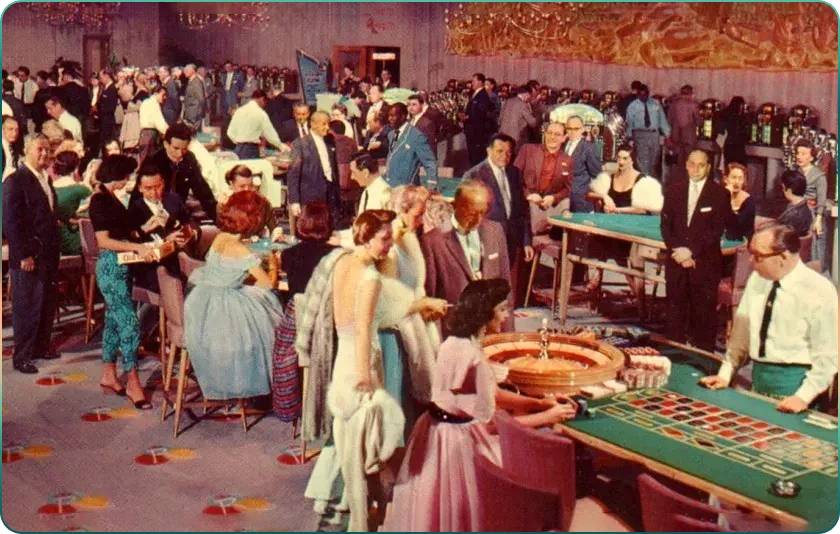The Controversial Rise of Gambling Ads - From TV Screens to Mobile Phones

As talk of a ban on advertising gambling permeates through Australia, this is how gambling ads became such a hot-button issue, from their beginnings to their controversial present
The world’s top gamblers are thinking about banning gambling ads. That’s the story coming out of Australia right now, a country that wagers more money per capita than any other nation in the world. A bipartisan parliamentary inquiry in Australia has seen numerous individuals come forward to discuss the effects of gambling in the country, with many politicians arguing that gambling ads are having a negative effect on their population, impacting mental health and in turn causing a strain on their health service.
The investigation revealed that there are not enough safeguards in place to protect those struggling with gambling addiction and suggested 31 reforms to prevent the “grooming” of a new generation of children into the habit, including a phased ban on advertising over three years. Pressure is now building on Prime Minister Anthony Albanese, both from within his own party and outside it, to take action. Polls indicate that a majority of the public supports a ban.
However, the government has hinted that it might consider imposing a cap on advertising instead of an outright ban. Officials have pointed out that gambling ad revenue is crucial for supporting the country’s struggling free-to-air broadcasters, and there are concerns from wagering companies that a ban might push consumers towards offshore operators. The peak body representing the industry argues that such a shift could lead to substantial tax losses on Australian betting platforms, which currently fund “vital services.”
This debate has sparked allegations that corporate interests are obstructing practical reforms and has brought attention to the strong connections between sport, gambling and entertainment in Australia. It’s a high-stakes game, and the outcome could set a precedent for other countries grappling with similar concerns. But to understand why this issue has come to the forefront, we need to rewind the clock a bit. Actually, quite a bit.
In a society where flashy billboards and clever TV commercials beckon us at every turn, gambling ads represent a unique kind of advertising. If you’ve turned on the TV or scrolled through your phone in the past few years, chances are you’ve seen your fair share. From promises of big wins to quirky characters urging you to “bet responsibly,” gambling ads are everywhere. But how did we get here? And why are these ads causing such a stir?
Let’s roll the dice on the history of gambling ads.
The Early Days: Gambling Companies Miss the Mad Men Boat (1960s-1980s)
In the 1960s, when Don Draper and his fellow fictional Mad Men were revolutionizing the advertising world, the gambling industry was sitting on the sidelines. At the time, gambling was largely confined to shady backroom card rooms, illegal betting rings, and, of course, the glitzy casinos of Las Vegas. Gambling shops were just starting to emerge as a legitimate business, but they weren’t exactly welcomed with open arms.
In the UK, for instance, betting shops were legalized in 1961. However, rather than embracing the neon glow of advertising, these establishments had to keep a low profile. The windows of these early betting shops were often blacked out to prevent prying eyes, and they were far from the slick, welcoming environments we see today. Advertising was minimal, as gambling was still considered a vice that decent folk didn't talk about openly.
The same applied to the US, where gambling was restricted to a few states, most notably Nevada. Sure, Las Vegas had its glitzy appeal, but outside of Sin City, gambling was often associated with organized crime and corruption. As a result, gambling advertisements were nearly nonexistent, as both regulators and the public were wary of legitimizing the practice.

The Winds of Change: “What Happens in Vegas…” (1990s-2000s)
Fast forward to the 1990s, and things started to change. The gambling industry, buoyed by the rise of the internet, began to see potential in reaching a broader audience. In the UK, the National Lottery launched in 1994, becoming an overnight sensation. Suddenly, gambling was no longer a dirty word. It was something that could fund schools, hospitals, and community projects. The public's perception shifted, and with it, the restrictions on advertising began to loosen.
In the United States, the rise of Native American casinos and the legalization of gambling in states like New Jersey brought the industry into the mainstream. The now popular past time was slowly shedding its shady image, and gambling adverts were a crucial tool in this transformation. By the early 2000s, casinos were advertising on billboards, radio and TV. Then, in 2003, an ad firm working for the Las Vegas tourist board came up with one of the catchiest advertising slogans of all time: “What happens in Vegas, stays in Vegas.”
The campaign was birthed by the advertising firm R&R Partners, in a meeting driven by the need to market Las Vegas as more than just a gambling destination. After a year of research, R&R concluded that the American gambling capital’s success would be built on a perception of freedom — on the one hand “freedom to be someone we couldn't be at home”, and on the other “freedom from whatever we wanted to leave behind in our daily lives,” as R&R explained in their own case study on the campaign.
With that freedom in mind, the premise of their campaign came alive: they needed to speak to the need of everyday people to escape their everyday lives, granting them access to a place where their wildest fantasies could run amok.
The slogan, originally written “What Happens Here, Stays Here,” worked as a punchline for a series of short skits in which characters referenced — but never explicitly remembered — the crazy time they’d had in Vegas. It became one of the most well-known and frequently mentioned taglines in contemporary tourism marketing, and it's now among the most recognized advertising campaigns in any industry.
The phrase has played a significant role in attracting millions of visitors to the luscious brick and mortar casinos of Las Vegas, inspiring a line in Usher’s classic club dripper ‘Love in This Club’ as well as the entire Hangover movie trilogy, and making its way into mainstream consciousness in 2004 when then-First Lady Laura Bush used the catchphrase in response to a question from Jay Leno on The Tonight Show.
But controversy was never far away. Even though the aim of the campaign was to shift Vegas’s image away from pure gambling, the NFL banned the ads from ever being broadcast during the Super Bowl — often considered the most prized advertising slot in the world. The NFL’s gambling ad ban has since been lifted, however, and this year the Super Bowl was held in Vegas for the first time in its history — with Usher performing ‘Love in This Club’ during the halftime show.
The Digital Revolution: “Make Things More Interesting” (2000s-Present)
Meanwhile across the pond, Irish betting company Paddy Power (no strangers to controversy) set about becoming one of the most ubiquitous names in 21st-century advertising with a series of posters launched in 2001. Fitted with the tagline “Let’s make things more interesting,” the posters depicted a series of scenarios overlaid with odds inviting onlookers to take a punt on the likeliest outcome.
The scenes included two children in a bath either side of a floating turd (odds on the culprit), a mosquito hovering above a naked man asleep on a bed (odds on which part of his body would get stung) and, most controversially of all, two elderly ladies crossing a road (odds on who would finish first — or who would be hit by the oncoming truck). The ads were swiftly banned by the Advertising Standards Agency.
Then in 2005 the UK Gambling Act opened the floodgates for gambling advertising. The act allowed companies to advertise UK casino sites and other gambling platforms on TV, radio and online, provided they adhered to certain standards. It was a watershed moment that would transform the landscape of UK media, as gambling ads became a staple of sports broadcasts, billboards and even the shirts of football players.
As the internet evolved, so did the gambling industry. Online casinos and betting sites exploded in popularity with commercials of all kinds of online casino bonuses and sports betting markets. Suddenly, gambling companies weren't just competing for customers' attention in the physical world—they were vying for eyes in the digital space.
In markets like the UK, Australia and parts of Europe, online gambling companies became some of the biggest spenders in advertising. The UK, in particular, saw a surge in gambling ads following the 2005 Gambling Act. By the mid-2010s, it was estimated that UK viewers were exposed to nearly 30,000 gambling ads on TV every year. These ads, often featuring catchy slogans, flashy graphics, and celebrity endorsements, were designed to make gambling seem fun, easy, and accessible.
Australia, too, saw a rise in online gambling ads, especially during sports broadcasts. Companies like Sportsbet and Ladbrokes became household names, and their ads were almost as much a part of the game-day experience as the action on the field. However, the sheer volume of these ads, coupled with concerns about gambling addiction, has led to calls for stricter gambling regulation.
The Aussies also had their share of eyebrow-raising ads. In 2017, Australian betting company Sportsbet advertised their new and improved Android app by recruiting a number of athletes — including the disgraced 100-metre sprinter Ben Johnson — who had been found guilty of using performance-enhancing drugs to face up the campaign. The message was clear: by using the Android Sportsbet app, bettors would be gaining an almost unfair advantage on anyone else who fancied a flutter that season. Or, as the tagline read, Sportsbet were “putting the roid in Android.” A media backlash ensued, but the ads generated millions of views online.
Key Moments and Markets - A Global Perspective
Below we will explore the pivotal developments in the gambling industry worldwide, highlighting growth trends, regulatory shifts, and more.
United Kingdom: The Gambling Act and the Rise of Sports Sponsorships
The UK's 2005 Gambling Act was a turning point, allowing gambling companies to advertise on TV and sponsor sports teams. It led to a surge in gambling ads, particularly during football matches. Companies like bet365, William Hill and Paddy Power became synonymous with the sport, with their logos emblazoned on team jerseys and stadiums.
But the backlash soon followed. Concerns about the impact on children and problem gamblers led to calls for tighter regulations. In recent years, the UK has introduced measures like the "whistle-to-whistle" ban on gambling ads during live sports broadcasts and the ban on using celebrities in ads that might appeal to minors. Even so, British viewers still regularly complain about the number of gambling ads broadcast during their favorite games, and recent controversies have put betting back on the sporting agenda, with high-profile footballers — including Brentford’s Ivan Toney and Newcastle’s Sandro Tonali — receiving lengthy bans for gambling in the past year.
Australia: The Love-Hate Relationship with Gambling Ads
Australia has a long-standing love affair with gambling, from pokies (Aussie slang for gambling machines) to horse racing. The rise of online betting has only added further fuel to this fire. The proliferation of gambling ads, particularly on TV during prime time and major sports events, has also sparked a national debate. In 2018, Australia introduced a ban on gambling ads during live sports broadcasts before 8:30pm, a move seen as a step towards protecting vulnerable viewers, especially children.
The current push for an outright ban on gambling ads reflects growing concerns about the impact on public health and the normalization of gambling. It's a battle that's far from over, and the outcome could have ripple effects across the globe.
United States: The Legalization Wave and the Rise of Sports Betting
In the United States, the 2018 Supreme Court decision to overturn the federal ban on sports betting opened the door to a newfound American gambling craze. States across the country began legalizing sports betting, and with it came a surge in advertising. Companies like DraftKings and FanDuel became major players, leveraging their daily fantasy sports (DFS) platforms to enter the sports betting market. Aside from sports betting, USA online casinos are booming as we speak, becoming one of the fastest-growing sectors in the country.
The US market, however, is still finding its footing. Regulations vary widely from state to state, and the industry is closely watched to prevent the kind of saturation seen in other markets. Nevertheless, with sports betting partnerships popping up across the NFL, NBA, and other leagues, gambling ads are becoming a familiar sight to American sports fans.
Italy and Spain: The Advertising Ban Approach
In response to concerns about gambling addiction, countries like Italy and Spain have taken a hardline approach, introducing bans on gambling advertising. Italy's "Dignity Decree" in 2019 banned all forms of gambling advertising, including sponsorships, making it one of the strictest gambling ad regulations in the world. Spain followed suit in 2020 with its own restrictions, limiting gambling ads to the early hours of the morning.
These bans reflect a growing trend towards stricter regulations, as governments seek to balance the economic benefits of the gambling industry with the need to protect public health.
Nordic Countries: A Push for Regulation
Countries like Sweden and Norway have also seen debates over gambling advertising. Sweden, which legalized online gambling in 2019, has implemented strict advert regulations, including limits on the use of bonuses and restrictions on advertising aimed at vulnerable individuals. Norway, on the other hand, maintains a state monopoly on gambling and has cracked down on foreign operators that target Norwegian consumers.
The Nordic approach highlights a preference for strong state control and consumer protection, reflecting broader cultural attitudes towards gambling.

The Infamous Ads: When Marketing Goes Too Far
No discussion of gambling ads would be complete without mentioning some of the more notorious campaigns that have sparked outrage and controversy. Perhaps one of the most infamous is Paddy Power's 2010 ad featuring a blind football team whose game is interrupted by a cat, resulting in the feline intruder meeting with a rather unfortunate fate. It was widely condemned for being offensive and in poor taste. Paddy Power, known for its provocative marketing, defended the ad as humorous, but it ultimately became a symbol of the industry's insensitivity.
Paddy struck again at the European Championships in 2012, paying the often-controversial Arsenal and Denmark striker Nicklas Bendtner a reported £200,000 to reveal their logo during a game. Bendtner duly obliged after scoring in a game against Portugal, receiving a one-game ban and an £80,000 fine. It was ambush marketing at its most insidious.
You might think that examples like these only serve to harm public perception of gambling ads, offending viewers and strengthening the case for a ban. But in the eyes of companies like Paddy Power, any publicity is good publicity.
It remains to be seen whether Australia’s proposed ban on gambling ads goes through. If it does, it could set a precedent in countries around the world, prompting other governments to reconsider the ethics of broadcasting gambling ads to the general population. But until that happens, we’ll just have to put up with them.





Review this Blog
Leave a Comment
User Comments
comments for The Controversial Rise of Gambling Ads - From TV Screens to Mobile Phones